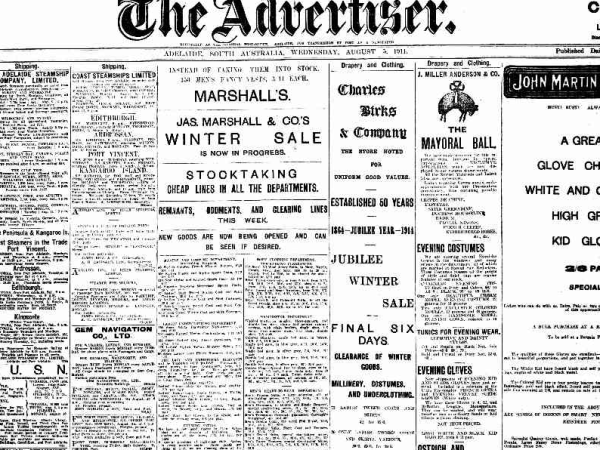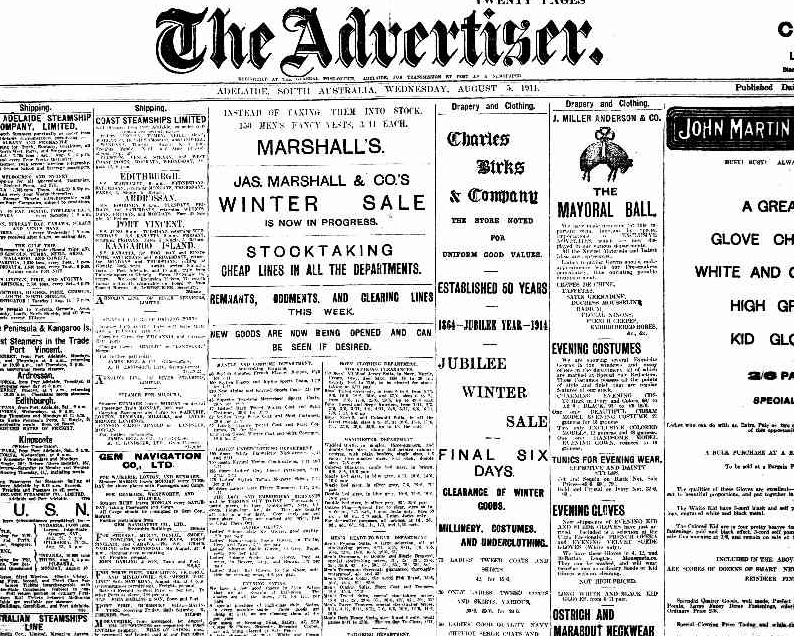Advertiser – November 1918
1 November 1918 p 7
JAPANESE PEACE TERMS
TOKIO, October 30.The “Kohumin” publishes Count Okuma’s article outlining the suggested peace terms, and declares:- “Though it is impossible to say what Japan will demand of the Peace Conference, Samoa should be left to Great Britain and the United States, while Australia should secure German New Guinea, and Japan should take the Marshall, Caroline, and Ladrone Islands.
2 November 1918 p 8
HOTELS AND PEACE
Melbourne. November 1:- ln the House of Representatives today Mr. Bayley asked if the government, recollecting the happenings in Australia during the Mafeking rejoicings, would frame a regulation to close all hotels on the occasion of the declaration of peace.
The Acting Prime Minister said it might be advisable to take steps for the preservation of order and safety long before the formal declaration of peace, and the Government were considering the matter. The Government had already full power to close hotels if that step were considered necessary.
12 November 1918 p5
JOY EVERYWHERE
Never in the history of South Australia has such a tremendous crowd assembled in King William-street, opposite the Town Hall, as on Monday night, when the glorious news of the signing of the armistice was made public. It was anticipated that the latest cablegram would arrive probably about 10 o clock, and the majority of the 30,000 or 40,000 people who were gathered together in the thoroughfare between the Majestic Theatre and the General Post Office delayed their arrival at the rendezvous until about 9 o’clock. Shortly after 7 o’clock a special edition of the “Express” was published, long before any other paper was on sale, announcing that Germany had signed the armistice terms, and the crowds who were on their way to the places of amusement either altered their minds and remained in the street or spent only part of the evening in the halls. It was only 9 o’clock before the trains packed with passengers from all the suburbs began to discharge their living freight at the city terminals, and by 10 o’clock King William street was alive with men and women, boys and girls, all gloriously happy and bent on giving expression to their feelings of joy in any form which suited the moment. The enthusiasm was unbounded, everybody seemed to have let loose a flood of delight, it was a night never to be forgotten. The war had ended: the people knew it, and they were intoxicated with joy, but, although such a vast throng joined in the patriotic displays and made merry as befitted the occasion, there was not the slightest exhibition of bad behaviour…
27 November 1918 p6
THE INFLUENZA PANDEMIC
Between the so-called Spanish influenza, which has reached New Zealand and Australia, and the Russian “grippe,” which ran round the world in 1899, there appear to be no differences that can properly be described as specific. Influenza takes various forms, sometimes one group of symptoms assuming special «prominence, sometimes another, but usually all these varieties co-exist in a single epidemic. The world outbreak against which the Australian public health authorities are now taking quarantine and other precautions is admittedly very severe, the broncho-pneumonic complication being answerable for a quite exceptional number of fatalities. It does not seem an extravagant assumption that the lowered vitality of the European populations in consequence of underfeeding during the war may account for the- wide spread of the disease at the present time and the high degree of virulence it exhibits. Probably a subsidiary reason may be that the “immunisation” gained as a result of the last pandemic is by now pretty well exhausted
28 November 2928 p 6
THE ROLL OF HONOUR
“Faithful Until Death”
447th Casualty List



